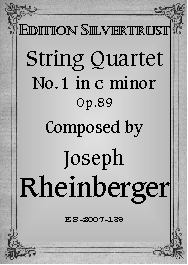Presents
Joseph Rheinberger
String Quartet No.1 in c minor, Op.89
 Joseph Gabriel Rheinberger (1839-1901) was born in
Vaduz, the capital of Liechtenstein. At the age of 5, young Joseph was given
piano and organ lessons from a local teacher. His talent was immediately
discovered and was of such a substantial nature that with the help of a
scholarship he was sent to the Royal Conservatory in Munich where he studied
with Franz Lachner, one of Schubertís close friends and an important composer in
his own right. Remembered today only for his organ compositions
which are considered the most important ever written after those of Bach, during
his life time Rheinberger was a much respected composer, generally ranked after Brahms
and Wagner as the most important living German composer. Furthermore, he
was also generally regarded as the leading teacher of composition during most of
his lifetime. Among his many students were Humperdinck, Wolf-Ferrari, George
Chadwick and Wilhelm Furtwangler.
Joseph Gabriel Rheinberger (1839-1901) was born in
Vaduz, the capital of Liechtenstein. At the age of 5, young Joseph was given
piano and organ lessons from a local teacher. His talent was immediately
discovered and was of such a substantial nature that with the help of a
scholarship he was sent to the Royal Conservatory in Munich where he studied
with Franz Lachner, one of Schubertís close friends and an important composer in
his own right. Remembered today only for his organ compositions
which are considered the most important ever written after those of Bach, during
his life time Rheinberger was a much respected composer, generally ranked after Brahms
and Wagner as the most important living German composer. Furthermore, he
was also generally regarded as the leading teacher of composition during most of
his lifetime. Among his many students were Humperdinck, Wolf-Ferrari, George
Chadwick and Wilhelm Furtwangler.
The String Quartet No.1 dates from 1876. It is clear from the first notes of the huge, opening Allegro non troppo that this is a quartet which cannot be simply linked to the Viennese Classicists as part of their direct lineage. The style is quite individualistic with the music being dominated by the rhythm. At first there is a hint of mystery but then the music is almost transformed into an exotic oriental dance. The surprising tempo creates an unusual slackness. A very fine Adagio expressivo follows. The opening theme is hymn-like and is elegiac. In the middle we find a brief intermezzo followed by a romantic duet between the viola and 1st violin. The slinky opening theme to the Scherzo non troppo vivo begins in unison. It bounces along in a genial fashion with the theme thrown back and forth between the voices quite cleverly. The trio is a muscular affair which provides a good contrast to the main section. The viola introduces the rhythmically syncopated and restless opening theme to the finale, Allegretto. Again, rhythm rather than melody dominates and the forward motion is very convincing.
The Editor of the Chamber Music Journal described this work as "a very good quartet which deserves to be performed in concert." We agree with the footnote that it should not be missed by amateurs. Long out of print and hard to obtain, we are pleased to make it available again
Parts: $24.95